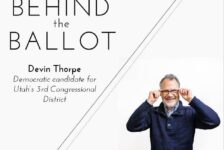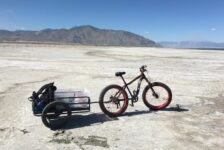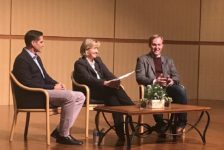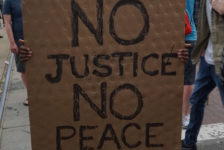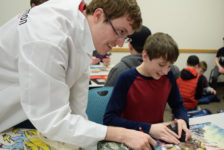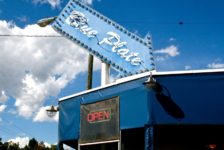![Westminster College’s NoDAPL and Utah Activism Panel on Nov. 7 discussed issues that the college’s 1 percent Native American population faces. “Native lives matter, and we don’t talk about that enough,” said Daniel Cairo, Westminster’s director of student diversity and inclusion. “We don’t talk about how the community is facing struggles that we [non-Natives] are totally disconnected with.” Photo by Christian Anderson.](https://static1.squarespace.com/static/55aa8118e4b06df5b45e94af/55aa8449e4b0ca41a0a30cb4/5850a4d9893fc0a6ea8d0e08/1481680193786//img.jpg)
Westminster College’s NoDAPL and Utah Activism Panel on Nov. 7 discussed issues that the college’s 1 percent Native American population faces. “Native lives matter, and we don’t talk about that enough,” said Daniel Cairo, Westminster’s director of student diversity and inclusion. “We don’t talk about how the community is facing struggles that we [non-Natives] are totally disconnected with.” Photo by Christian Anderson.
Every month from September to April, Westminster College’s Diversity and Inclusion Center highlights a historically oppressed and underrepresented culture with a campus-wide heritage month. To address issues Westminster’s Native American students face, November—National Native American Awareness Month—focused on the American Indian community.
“Native lives matter, and we don’t talk about that enough,” said Daniel Cairo, Westminster’s director of student diversity and inclusion. “We don’t talk about how the community is facing struggles that we [non-Natives] are totally disconnected with.”
During Native American Heritage Month, various Westminster clubs and organizations and the Diversity and Inclusion Center highlighted issues the college’s Native American population faces —including The Dakota Access Pipeline at Standing Rock (NoDAPL), Bears Ears National Monument in Southern Utah and the historical impacts of the United State Government’s forced boarding schools for the Navajo (Diné) Tribe.
With these current events in mind, Cairo said members of the non-Native community must protect Native Americans rights now more than ever—especially the rights of the 1 percent Native American students on campus.
“The issues that are impacting the Native community right now are actually issues that are impacting us all,” Cairo said. “Look at Standing Rock alone—issues of water, issues of the environment, issues of having conversations about 500 years of colonization—those are conversations that all of us need to be diving into so that we can essentially be a stronger community.”
On Dec. 4, just days after the end of Westminster College’s Native American Awareness Month, many celebrated what some have called a victory for the water protectors of Standing Rock, when the U.S. Army Corps of Engineers legally blocked further construction of the Dakota Access Pipeline. However, many fear that President-elect Donald Trump will undo this and cause further harm to tribes across the nation.
“The election of a Republican president, and a Republican majority in both houses of Congress, will shift the debate over public lands in important ways,” said the Utah League of Native American Voters on Nov. 30 in a news release. “Their decisions will impact land use at the federal, tribal, and state levels, the sovereignty of Native American communities, and influence environmental, recreation, cultural, economic, and political issues now and in the future.”
On Dec. 15, the Utah League of Native American Voters will host a panel at Westminster College with the Student Diversity and Inclusion Center and the Indigenous Peoples of Westminster College to examine how the proposed Bears Ears National Monument will affect Utah and local tribes.
The Bears Ears Inter-Tribal Coalition—the Hopi Tribe, the Diné Nation, Ute Mountain Ute Tribe, the Pueblo of Zuni and the Ute Indian Tribe—aims to protect culturally sacred lands and the environment from looting, mining and other energy developments, as well as motorized vehicles and uneducated visitors, according to Dave Pacheco, a Utah Grassroots Organizer for the Southern Utah Wilderness Alliance (SUWA). The coalition proposed the Bears Ears National Monument with support from various grassroots organizations.
“The Bears Ears land is a unique cultural place where we [the Inter-Tribal Coalition] visit and practice our traditional religions for the purpose of attaining or resuming health for ourselves, human communities and our natural world as an interconnected and inextricable whole,” Pacheco said. “When we speak about health, we are not only talking about an individual—we are talking about one’s health in relation to others around us and that of the land. We are talking about healing.”
According to Pacheco, the monument is designated under the Antiquities Act of 1906, which aims to protect cultural, natural and scientific features on public lands. The proposed area is 1.9 million acres of the Colorado Plateau that is considered sacred and ancestral to the Bears Ears Inter-Tribal Coalition.
“The member tribes of the Bears Ears Inter-Tribal Coalition hold the Bears Ears immediate landscape, as well as the lands fanning out from its twin plateaus, as traditional sacred lands,” Pacheco said. “This land is a place where tribal traditional leaders and medicine people go to conduct ceremonies, collect herbs for medicinal purposes, and practice healing rituals stemming from time immemorial, as demonstrated through tribal creation stories.”
Pacheco said SUWA and the Bears Ears Inter-Tribal Coalition want the proposed National Monument to be managed by the tribes and federal agencies in collaborative efforts.
“SUWA believes Bears Ears is a positive step forward for Native American respect and healing and for conservation of the natural environment and America’s healing,” Pacheco said.
Opponents to the Bears Ears Coalition, including both Native Americans and non-Natives, have said they believe the monument will cause more harm than good to Native Americans by encouraging tourism to the sacred lands and preventing the Navajo Tribe from returning to the lands after their forced removal in the 1800s.
Thomas Sawyer, a tribal member of the Eastern Band of Cherokees and former chairman of the National Advisory Council for Indian Affairs, said he can’t pick a side because he sees the logic in both arguments. However, he said Native Americans experience continued injustices that can’t be ignored.
“Equality is critical to a true democracy for it to survive,” Sawyer said. “Native Americans have suffered the greatest discrimination and degradation of any culture in America, which was their home long before they were considered to be ‘animals’ and not human by European standards.”
Although Sawyer said he wasn’t able to choose a side on the proposed Bears Ears National Monument, he said the nation needs to fight for Native Americans’ rights to education, healthcare and job opportunities.
Though Native American Heritage month is now over, Westminster’s director of diversity and inclusion said the conversation is far from finished.
“Heritage only allows us to focus on a particular demographic every month, but it is my hope that we have the conversation about how to be inclusive of our Native population on campus throughout the whole year and not just because it’s Native American Awareness Month,” Cairo said. “Yes, the programming happens [in November], but our engagement needs to be year long—and I would say that about any other demographic that we do [throughout the heritage month series]. This series and this month just give us an entry point of the conversation and we just have to stay engaged. That’s how we are strong.”


